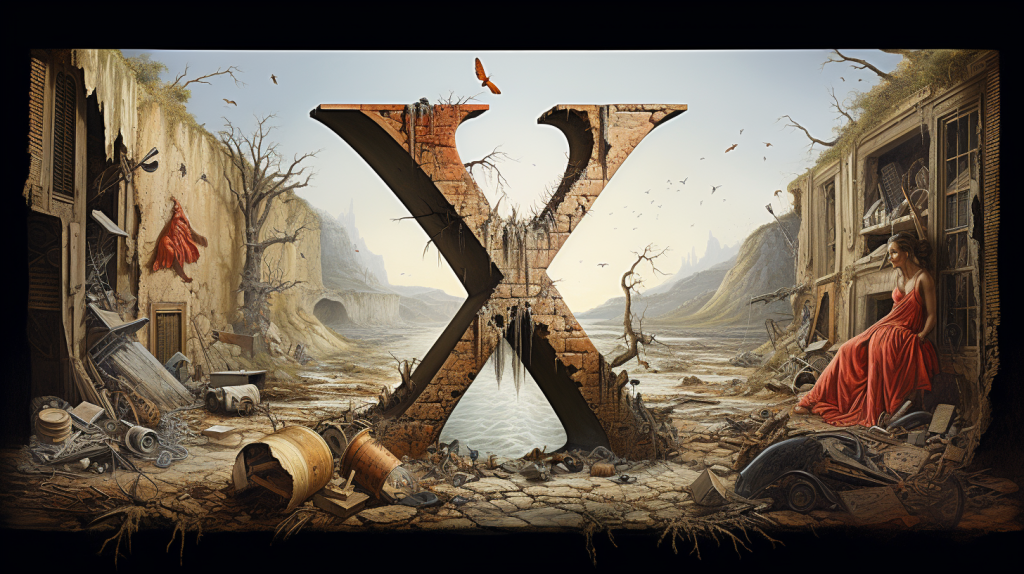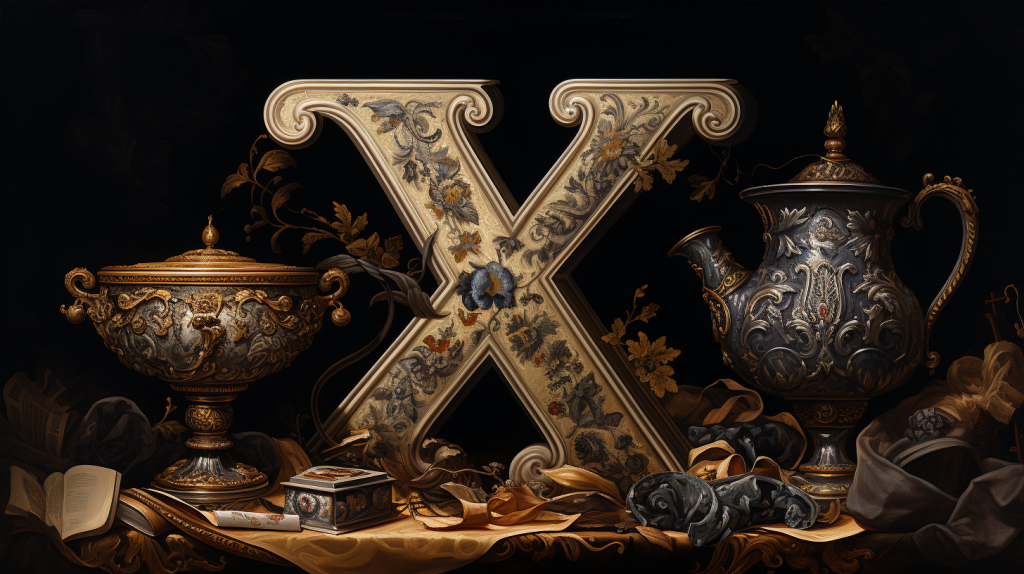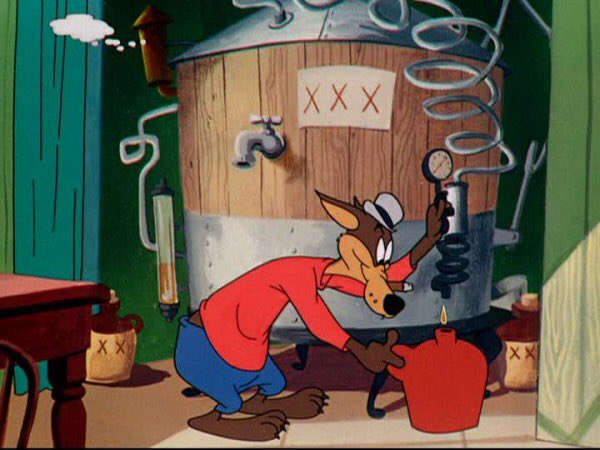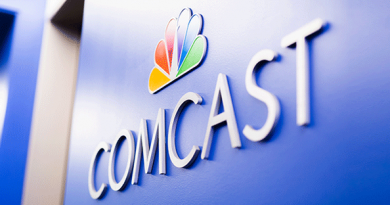World War X: Elon Musk, Twitter, and the Peculiar 24th Letter
The recent controversy over Elon Musk’s abrupt and inexplicable renaming of Twitter to “X” has sparked chatter around what is going on inside manchild’s head these days. Some analysts argue that this will wipe tens of billions of dollars off the value of a brand that probably wasn’t worth anywhere near that much to begin with even before the rebrand. Also, critics wonder: didn’t he do this before? Like, twenty years ago, or something? He sure did! Anyway, let’s dig into the ‘x’ a bit– not in terms of what it means for Twitter, but how we can use history to read it a bit better.

Elxn Mxsk and the 24th Letter
Musk’s attempt to brand PayPal as “X” actually got the man canned from the fledgling company. x.com was Musk’s own venture, founded in 1999 as an FDIC-insured bank that offered customers benefits that were then unheard of, like a cash sign-on bonus and no overdraft fees. Musk founded the company with three others including banker Harris Fricker, whom he later fired, and funded the venture in part with funds from his sale of Zip2, a primitive Craigslist slash yellowpages. Around that time, the other two founders left the company as well. PayPal acquired X.com in 2001, which precipitated all manner of disagreements between Musk and, well, everyone, basically, that resulted ultimately in Peter Thiel and friends ousting him as CEO.
I’d like to add an editorial aside that given Peter Thiel is one of the biggest assholes on this planet Earth, it’s impressive that someone seems to have proven himself capable of being an even bigger asshole.
Musk would bring home a few bucks from the sale of PayPal to eBay in 2002, probably something to the order of about $170 million. This was money he quickly invested into the nascent SpaceX venture (recall he had made millions on the sale of his first company years prior). Contrary to popular belief, Musk didn’t found Tesla, but invested one of the larger chunks of change of several million dollars as a Series A investor of the company in 2003-4. The Tesla Model X came in 2015, kid number eight X AE A-XII Musk came in 2018, while xAI came in 2023. Meanwhile, the Neuralink logo looks mysteriously like an ‘X’. That’s almost as many X’es as Elon Musk has exes. Or kids.
While we’re already questioning the sanity (and apparent inability to understand contraception) of the man that someone once called the White Nick Cannon, is there perhaps an appeal of the X that we might be missing?
How “X” Got So Cool
Let’s be real here and get that first uncomfortable truth out of the way: in the English language (and many others), “X” is just a pretty neat letter.
In English, it’s edgy, but without the fraught Anglo-Saxon consonant combinations often tied to other edgy letters, like the letter ‘t’. It flows, unlike the voiceless velar plosive of a hard ‘k’ sound that makes up the first “half” of its consonant sound, and also unlike ‘k,’ it natively works in the middle of sentences or in the beginning with its alter ego as a ‘z’ sound. X is also mysterious, but not weird, like Zorro or the space alien Zorak, with whom I share the pronunciation of my last name. It’s not weird like ‘W’, nor is it ambiguous and stretched out like ‘Y’.
With its shapeshifting abilities to morph into a ‘z,’ X always seems to precede exotic words, like xanthic, xylem, or xylophone, while ‘x’ in the middle of words often seems to convey some sort of power through the plosive+sibilant twofer, if you will. A jab and then a hook! The ‘eks’ sound combines the voiceless velar plosive of the ‘k’ with the voiceless alveolar sibilant sound of ‘s’ for a sound that is declarative on the way in, and sneaky on the way out. These are power words. Excite, excise, or expert, extravagant, extrovert. Words with “x” but without “ex” (e.g. axon), including words where that combination is attached to other letters (e.g. textile), still have that funky, strong, yet slick sound.
In or outside of the English language, X is one of the more dynamic letters, standing in for all manner of sounds (Wikipedia lists 20 potential phonetic modes for pronouncing ‘y’), much like its neighbor “y” (22 different sounds). It’s the variable letter, kinda like algebra (remember this, as we’ll return to it shortly).
Anyway, how does this factor into corporate naming conventions?

American Corporate History X
Whether corporate names or product names, companies make up names all the time. One day, historians may well refer to the different eras of the capitalocene epoch by the gimmicks of the conventions corporations use to name themselves or their products. The birth of innovative-sounding names probably came out of the birth of industrially innovative products. Wartime shortages of soap in the 1910s lead to the development of laundry detergents that used synthetic surfactants in products like FeWa (1932, abbreviation for fancy laundry, basically) or Dreft (Procter & Gamble, 1933). The 1950s saw companies with old family names like DuPont or Dow make products with Jetson-esque, space age, completely made-up names, like Lycra (1958), Dacron (1959), or Rayon (that name was coined in 1924).
The parents of the modern tech cluster in San Francisco went from names like Fairchild Semiconductor (1957-2016) to Intel (1968-present), Maxtor (1982-2006, acquired by Seagate), and Seagate (1978-present). Some names were more on what we might think of as the dry side, like Control Data Corporation (1957) or Digital Equipment Corporation (1957-1998), while others evolved from historical names, like Burroughs (1886-1986, when it merged with UNIVAC). National Cash Register (1886) became NCR, which it remains today after a brief tenure being held by AT&T. Acronyms are, of course, huge– like RCA (Radio Corporation of America, 1919-1987-ish), UNIVAC (Universal Automatic Computer, 1951-1986), or, of course, IBM (International Business Machines). My linguistic theory here– which, let’s remember, I’m completely unqualified to offer as anything but a theorist and lover of words and language- is that sleek new upstarts needed to differentiate their brand identity from the industrial stalwarts of the age of the megatrust, and this is where a lot of the meaninglessness of tech corporate jargon emerged.
The early internet was dominated by names that now sound rather dated– Elon Musk’s Zip2, for example, or other names that sound like they might well be a brand of ill-fitting Chinese apparel products sold to you via an Amazon Marketplace retailer (think Kozmo, BizBash, Flooz, or Boo). eBay, which is still around and makes money, was named after its geography in the East San Francisco Bay Area, but cleverly capitalizing on the electronic everything “e” prefix. Other products have fallen by the wayside in spite of having had, in the opinion of the author, kinda cool-sounding names, like Netscape or Altavista. These are sensible names, even if they’re made up.
Tech Boom 2.0, on the other hand, is defined by a combination of companies that embraced just weird novelty names, like “Lyft,” Yelp,” “Twilio,” or “Uber,” and by companies that took a normal word and added “-ly” or “-ify” onto the end of it. Or, a third option in which they took a normal word and spelled it funny (“Google” being a gentle misspelling of “googol”). Shopify and Spotify were founded in the same year (2006), and then we have Flickr (2004), Tumblr (2007), and Bitly (2009). Then there was the craze of the ‘i’ prefix, thanks to Steve Jobs, which for awhile was on everything ranging from iProducts to the television show iCarly (2007-2012 and its 2021 revival, whose third season just dropped last month!).
In Homer Simpson’s ill-fated attempt to start a dot-com business in an episode that aired in February of 1998, he suggests a name that, he says, will demonstrate that he is at the forefront of innovation (“Cutco… Interslice… Edgecom!”), before settling on Compu-Global-Hyper-Mega-Net. Oh, and remember Cutco? Another brand with a portmanteau name that goes back to the midcentury!
Some names have some vague foundation in meaning, of course, like how “Enron” is making use of many of the same letters in the word “energy.” What the “ron” means is anyone’s guess. Or, how “Xerox” (again with the power letter) refers to the Greek root of the word for “dry” (because photocopiers use powdered ink rather than liquid). Some are nearly fantastical, like Mondelez, which sounds perhaps like some exotic, Spanish-Basque hybrid name referring to the Latin root for the word “world.” But while the “Mond” almost inevitably does want to convey that element of, ahem, transnationalism, the rest of it? Well. Know what they used to be called before this?
Nabisco. The National Biscuit Company. Put that in your pipe and smoke it, kids.
Of course, few of these have ‘x’– this is just background to try and explain a bit about how companies muddle through the process of naming themselves and their products. I did mention Xylem and Xerox, though, perhaps the most notable ‘X’ companies, along with perhaps in-fix-X’d Textron, a defense contractor whose name originates from– back to the first paragraph of this section- a synthetic textile produced by one of its progenitors. Texaco, whose name obviously derives from its Lone Star roots, was perhaps the last large household name with an X, and has been defunct as a subsidiary of Chevron since 2005. There are still a few more, like FedEx, and, one of my favorite, Equinix. What is Equinix? A space-age horse company?
Oddly, the highest concentration seems to be in medicine, where we have the likes of Dexcom, Baxalta, Alexion, Vertex.
The Mathematical Mystique of “X”
What about the fact that ‘x’ in mathematics refers to an unknown variable? This is where things start to get interesting. X either serves as a thing toward the end of the alphabet to get buried, or as an unknown and exotic algebraic variable, a concept that virtually every American is going to be familiar with by way of high school algebra class. It’s also possible that the Latin prefix “ex” played in here, as the letter “x” might then signify to some degree ostracization, or distancing by way of the Latin root “out of” or “from.” This could explain why midcentury film censors moved to the “X” for films rated completely unsuitable for the youths. It’s far away. It’s removed, like the “ex” prefix. We have taken pornography “out of” society.

Older still is the root of the use of “X” to refer to alcohol, as depicted famously in many an old-timey cartoon. While this practice seems to date back to quality labeling of beer as early as the 17th century in England, it was later brought to the United States, where it came to typically refer to the number of times a grain spirit had been distilled. Moonshine, for example, would be distilled into iterations with higher and higher alcohol content, until the third pass, when it developed its XXX character and label. It’s not quite clear where this trend began, but the iconic bottle labeled ‘XXX’ is synonymous with both old cartoons and the popular imagination of the Prohibition Era in the Roaring Twenties and the Depression. See the above Looney Tunes reference from the early 1950s.
Dos Equis (Two X’s) derives its name not from the alcoholic ‘X’, but from its launch to stan the 20th century, when it was called Siglo XX. I feel like it’s pretty badass for a beer brand to call itself “20th Century.”
Let’s recall some unrelated examples, too, just for fun.
The city seal of Amsterdam features three white Xs on a black surface. (Sorry, it has absolutely nothing to do with the city’s metonymic association with vice!). There’s also the Triple XXX Family Restaurant in West Lafayette, which, well, we don’t know either, frankly. There are an absurd number of examples of people naming places or businesses solely because of where the name will fall in directory listings. Such was ostensibly the reason why a dude thought to name a city in mid-Michigan, “Zilwaukee.” He reasoned that people knew Milwaukee, so, why not add a name that would be instantly recognizable, but would also show up close to the tail end of a directory listing, in case someone was starting from the back, rather than the front?
Primitive search engine optimization. Man, what a dumb thing.

Back to Musk?
Speaking of dumb things, truth be told, we’re still no closer to understanding Elon Musk’s. We don’t really get his longtime fascination with “X,” except that he’s a bit of a weird guy, and seems obsessed with revisiting bad ideas, no matter how badly they seem to flop. Apartheid didn’t go so well for his native South Africa, yet he’s now created a social platform for far-right and fascists. And the attempt to rebrand PayPal as x.com, the company that it kinda-sorta was before it was PayPal, failed spectacularly, but he’s now trying to Xeet it back into existence.
Of course, there’s nothing particular that prohibits one from having an obsession with a letter.
My brother, for example, is obsessed with the letter “b”. Alex has a website called bplant.org. And has worked on a number of other projects in my recollection that refer to the letter ‘b’. He grew up in the 1980s and 1990s and witnessed the birth and evolution of a new era or two of street slang, which has often included the term ‘B’, and I happen to know that my brother is particularly fond of hip hop from this era as well. So, perhaps it’s a nostalgia thing.
Anyway, B or X, to this day, it’s unclear to me whether this is just part of the Alex brand, or if it is a shared commonality with Mr. Musk in that it’s probably just a smart people who are probably on the spectrum thing. We all have letters. (Mine is ‘M’, by the way, I just find that letter so utterly pleasing— a bold and proud shape, and an anchor of important words!).
Anyway, the damage Musk has done to the Twitter brand is beyond debate. Analysts have pointed to the departure of the majority of advertisers, while users (like myself) have complained about the platform being taken over by right-wing bots and fascist ideologues emboldened by the new owner’s commitment to allowing everything ranging from antisemitism to child pornography. That is not good business, of course, whether you’re asking a duly appointed member of the Ivy League Extended Universe about the company’s potential enterprise valuation, or just thinking about, well, common sense. Anyway, I’m going to stick around on the platform probably until the bitter end, as Threads is just way too boring to be a competitor at the moment and LinkedIn seems a bit too uptight for my taste. But we’ll be sure to follow the saga as it continues to evolve, with exciting highlights like Elon Musk thinking he was going to go head to head with a municipal building department. Good luck, Clyde!




